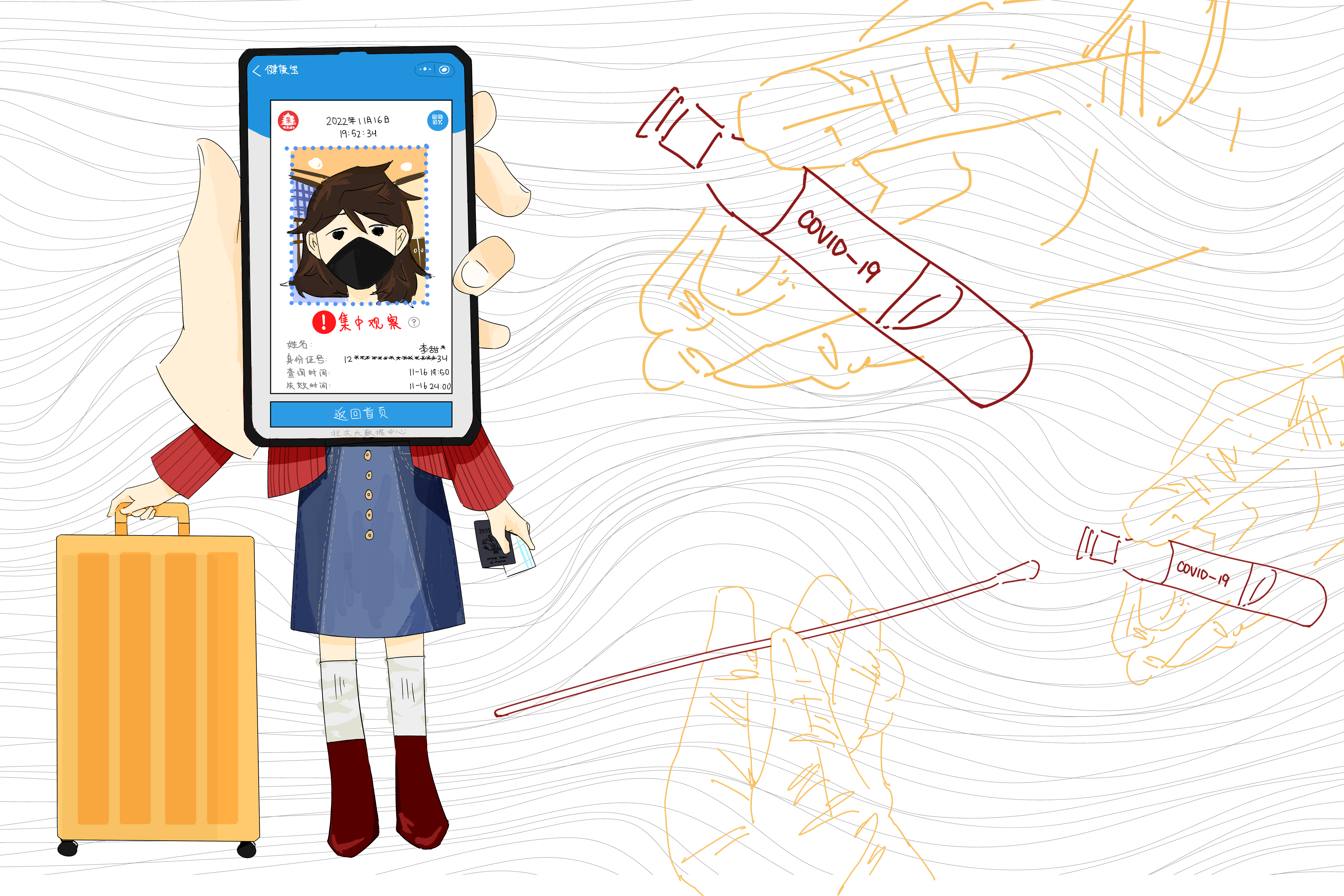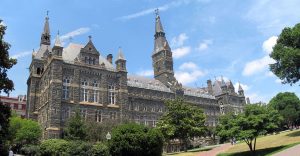In late May 2022, when most Hoyas had already reunited with their families, Fenny Qi (MSB ’25) stood with heavily packed bags on both sides, thinking about how she ended up at the Tacoma Airport in Seattle—5,705 miles from Shanghai—with no idea how she would get home. Given the 12-hour time difference, her parents were fast asleep, and Qi, with her friend Penny Li (COL ’25), frantically ran through their possible options, including the expensive option of staying in the U.S. At that moment, however, both women thought they may be stuck in Tacoma indefinitely.
“We thought we literally weren’t going back to China and then we stayed for the entire night at the airport,” Qi said. “All our plans were based on going back to China, so I had no idea where I was going to stay, what I was going to do in the summer in the U.S.”
For the Chinese students who brave the monthlong ordeal of travel and quarantines to return to China, the hope of seeing family members after being abroad for a full year and missing life at home are the primary motivations for going back.
“I wanted to see my family, especially my grandparents on both sides,” Qi said. “I wanted to go back to be able to make them happier.”
Qi and Li’s journey back to China was mired by the logistics of the Chinese government’s COVID-19 policy. At the time, entry into China required a seven-day pre-travel quarantine at one of the few departure cities that still service direct flights—Seattle being one of them, which brought Qi and Li to Tacoma in the first place. Indeed, because D.C. is not one of those cities, Chinese students must travel significant distances to test, quarantine, and await their flight. Qi recalled that the government-recognized pre-travel COVID tests alone cost upwards of $400, not to mention plane tickets costing up to $5000 for economy class due to a tit-for-tat series of flight suspensions initiated by the Chinese government.
Getting on a plane with test results in hand clears only one of many hurdles. After Qi had already boarded her flight and settled into her seat, Delta announced their pilots had exceeded their flight time limitations. And no replacement was to appear: An industry-wide severe pilot shortage was intensified for East Asian routes by a mass resignation of pilots flying to mainland China and Hong Kong. Qi and her fellow passengers were shepherded off the plane. After meeting up with Li, the two scrambled to find a place to stay.
“Eventually, we called the airlines a million times to negotiate, and they agreed to change our flight to two weeks later. I would never go back to Seattle airport if I can choose not to. It was literally traumatizing,” Qi said.
For Chinese international students, the tumultuous return home is merely a symptom of the Chinese government’s broader “zero COVID” policy apparatus to manage COVID-19. It involves a system of strict restrictions on mobility to protect the country’s vulnerable or unvaccinated populations against increasingly infectious variants. It’s a policy that has lasted for almost three years, and with recent lockdowns in Guangzhou, the country’s third largest city, it shows no sign of relenting.
Consequently, getting onto Chinese soil is just one part of the process. Travelers arriving in China enter a stringent quarantine system after landing. Prior to the most recent policy change in June 2022 that shortened the entire isolation process to 10 days, all passengers had to enter a two-week, supervised hotel quarantine upon arrival and were required to quarantine at home for an additional week after. Isolation facilities can vary dramatically in quality depending on location and resources.
Though guidelines loosen once travelers are permitted to begin home quarantining, local community workers may install electronic locks on the apartment door if residents are found leaving their residences without permission.
Kristen Xiao (SFS ’25) went through this quarantine process in 2021 and decided not to return this past summer.
“Because I have been back in China one year ago and went through the quarantine, I just didn’t feel like there is a strong support system, and it was just challenging for my mental health,” Xiao said. “I was just mentally prepared that I may not be back home until junior year, so in freshman fall I just started looking for opportunities over the summer in the States.”
Li was clear there were no good proxies for going back home.
“What I miss more here is my lifestyle back in Shanghai. Things that I will do a lot back in Shanghai, I won’t be able to do it here,” she said. “Back in China, our social bonding was mainly related to food: We cook together and go out to eat. Here in the U.S., the main social activity is partying, which is not something I am used to.”
Both Qi and Li said that COVID policies drastically changed their experiences back home. Though some changes such as restaurant closures led to more well-off citizens participating in “restaurant hunting,” a trend of searching for dining locations that remained open discreetly, in violation of strict restrictions, other policies had more severe outcomes.
The government’s enforcement of “zero-COVID” relies on an extensive color-coded health system integrated into Chinese social media apps such as WeChat and Alipay. The system limits the movement of citizens based on contact tracing and other forms of surveillance. Green indicates free movement, yellow requires a series of PCR tests, and a red code entails an often undefined period of self-isolation. All citizens must scan a “Health QR Code” wherever they go, and keeping a green code and access to public spaces requires a PCR test every 72 hours—although there are many reports of health codes mysteriously changing.
Sudden lockdowns of individual neighborhoods where residents have come in contact with COVID-positive individuals are common, constituting one of the most disruptive policies imposed by the government.
“If you live in a building with a person in contact with a COVID-positive person, the building gets locked down for two days,” Qi said. “This happened to me five times, it’s crazy.”
Public attention around the extremeness of China’s “zero-COVID” policy peaked with the two-month-long lockdown of Shanghai, a city of over 25 million people. Beginning in March 2022, neighborhoods in Shanghai experienced localized shutdowns due to the Omicron variant. Almost immediately, grocery shortages occurred as residents panic-bought supplies, but conflicting messages from health authorities about the length of the upcoming lockdown hampered residents’ ability to effectively stockpile for the impending shutdown. What began as a five-day temporary measure eventually evolved into a citywide shutdown that ended more than two months later in early June.
“Before I left for the States, I knew there are a lot of strict COVID policies for all of China based on personal experience during quarantine, but I have never expected the same kind of policies to be implemented at such a large scale in Shanghai,” Xiao said. “A lot of us thought, ‘Even if all the cities in China went into lockdown, Shanghai would be the only one that wouldn’t go into lockdown.’”
The lockdown in Shanghai undercut China’s most prosperous economic hub, but the human toll was just as high. Outrage over a lack of access to essential goods, even food and water, and instances of residents finding themselves unable to access critical health services like cancer treatment flooded Chinese social media outlets.
“I was frustrated, because there was nothing I can do besides just reposting it, and even reposting cannot reach the people who are actually in need of resources to help them,” Xiao said. Chinese censorship has rendered its domestic internet entirely separate from international platforms such as Instagram and Google. The Chinese authorities likened complaints about the pandemic control measures on social media to “a virus of rumors” and quickly took down any such posts.
Even as new variants of the virus have become less severe, China’s “zero-COVID” policy continues to produce significant secondary damage: Many residents died of preventable causes during Shanghai’s lockdown. Requiring a negative PCR test result within the previous 48 hours to enter hospitals wasted precious time that could have been spent on emergency treatments, leading to the deaths of many patients with chronic diseases that necessitated immediate surgery. Such deaths have not been included in the official COVID death toll.
Abiding by the strict lockdown restrictions also places extraordinary pressure on residents, health workers, and government officials alike: As many as two in five Shanghai residents experienced depression during quarantine, with some choosing to tragically end their lives.
The experiences of those in Shanghai caused Xiao and many other students to rethink going home. “A lot of people’s mindsets have been shaken by the lockdown,” she said.
Despite hindering everyday life, COVID-related restrictions have remained favorable in the Chinese bureaucracy. In a Politburo meeting on July 28, President Xi Jinping announced that a strict pandemic response should be considered a sign of party loyalty, and his call was echoed across the country. Local officials showed their adherence to Xi’s leadership by conducting mass tests and “drill lockdowns,” even in cities without any reported positive cases.
“I think it’s more political than health. I think their handling of the issue is a little bit extreme,” John Yang (COL ’25) said. “This doesn’t turn me against the Chinese government, but I’m definitely upset because I can’t go back home.”
China’s extreme COVID-19 response has significantly increased student demand for on-campus housing at Georgetown during summer and winter breaks. Yichu Huang (SFS ’23) authored a November 2021 petition that urged the university to provide winter break housing for international students, many of whom faced extremely limited housing options.
“Many of us are unable to return home this winter as the quarantine time simply exceeds our break, not to mention the difficulty in securing international flights and the continuous risk of being exposed to the virus,” Huang wrote in the petition. “We urge the school to consider providing winter housing for students who are unable to return home at this unique time.”
After negotiating with students, the university eventually offered international students the opportunity to apply for housing at the university’s hotel, but winter break housing costs were not covered by financial aid. Moreover, the only on-campus dining option available was Epicurean and Company, which still charged flex dollars at the time. Students faced similar difficulties securing transition housing for the summer.
“The email of the transition housing last semester came too late, like in April. It was just kind of inflexible,” Xiao said. “When we already figured this out and paid a higher price for off-campus housing, it came, but there was no way we can get everything undone.”
According to a university spokesperson, several Georgetown offices “worked together to review requests and provide emergency housing and food support on campus during the summer” due to “emergency circumstances during the summer of 2022. Leaders in the offices of Residential Living, Student Affairs, and Student Financial Services will work with students who won’t be enrolled in classes this summer and who face housing insecurity to determine how to assist them.”
Students noted that being a Chinese international student during COVID is a unique burden—deciding when and how to travel home, especially given the extended quarantine and threats of lockdown, is unlike the decision calculus faced by many of their peers.
“Some of my friends just cannot imagine how we can stay a year away from our parents and what it feels like not able to go back to home,” Xiao said.
“My friends here haven’t experienced that, so they don’t truly understand that,” Qi said. “But we wouldn’t expect people to understand that because obviously we don’t want people to experience that.”
Qi and Li eventually got back to China—but only after being stuck in Seattle for an additional two weeks.
The ordeals of Chinese students like Qi and Li have, however, fostered closer community relationships.
“Having people in the same situation as you is very helpful. I feel like I got a lot closer to Chinese friends I wasn’t that close to [during] the summer because we were together, and we didn’t have our families here,” Yang said. This past summer, he worked for Residential Living and stayed with other Chinese students who did not return home.
As Yang’s family continues life under “zero-COVID” thousands of miles away, that sense of community among Chinese international students has been crucial. “We basically supported each other,” he said. “We would help each other move, going out to dinner together, just being like a family.”





